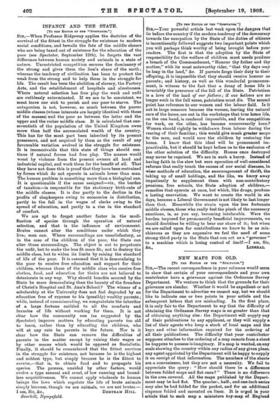INFANCY AND THE STATE. [To THE EDITOR OP THE "SPECTATOR."]
Sin,—When Professor Ridgeway applies the doctrine of the survival of the fittest in the struggle for existence to modern social conditions, and bewails the fate of the middle classes who are being taxed out of existence for• the education of the poor (see Spectator, September 12th), he forgets the vast difference between human society and animals in a state of nature. Unrestricted competition secures the dominancy of the strong and gives them the lion's share of the earth; whereas the tendency of civilisation has been to protect the weak from the strong and to help them in the struggle for• life. The result has been the abolition of slavery, the Factory Acts, and the establishment of hospitals and almshouses. Where natural selection has free play the weak and unfit are ruthlessly exterminated. If we are to be consistent, we must leave our sick to perish and our• poor to starve. The antagonism is not, however, so much between the poorer middle classes (whose interests are largely identical with those of the masses) and the poor as between the latter and the upper and the richer middle class. It is calculated that one- seventieth of the population of the United Kingdom owns more than half the accumulated wealth of the country. This has for the most part been inherited by its present possessors, and not acquired by them as the result of any favourable variation evolved in the struggle for existence. It is inconceivable that this state of things should con- tinue if natural forces had free play. The masses would wrest by violence from the present owners all land and industrial capital, and work them for the benefit of all. That they have not done this is proof that they have been restrained by forces which do not operate in animals lower than man.
The human problem is something more than a biological one. It is questionable if the cause assigned—viz., the burden of taxation—is responsible for the stationary birth-rate of the middle classes. It is due partly to the decline in the profits of shopkeepers owing to economies in distribution, partly to the fall in the wages of clerks owing to the spread of education, and partly to a rise in the standard of comfort.
We are apt to forget another• factor in the modi-
fication of species through the operation of natural selection, and that is the influence of environment. Brutes cannot alter the conditions under which they live; men can. Where surroundings are unsatisfactory, as in the case of the children of the poor, the State can alter those surroundings. The object is not to perpetuate the unfit, but to make the less fit more fit ; not to destroy the middle class, but to widen its limits by raising the standard of life of the poor. It is assumed that it is demoralising to the poor to receive free education and support for their children, whereas those of the middle class who receive free clothes, food, and education for theirs aro not believed to deteriorate in any way. Why should benefits secured by the State be more demoralising than the bounty of the founders of Christ's Hospital and St. Ann's School ? The winner• of a scholarship at the University does not feel degraded by an education free of expense to his (possibly) wealthy parents ; while, instead of commiserating, we congratulate the inheritor of a large fortune entitled to all the comforts and luxuries of life without working for them. It is not clear how the community can (as suggested by the Spectator) improve matters by educating parents too old to learn, rather than by educating the children, who will at any rate be parents in the future. Nor is it clear how the State can remove the difficulties of parents in the matter except by raising their wages or by other• means which would be opposed as Socialistic. Finally, it should be remembered that the fittest survives in the struggle for existence, not because he is the highest and noblest type, but simply because he is the fittest to survive,—that is, to obtain food and to propagate his species. The process, unaided by other• factors, would evolve a type sensual and cruel, of low cunning and bound- less acquisitiveness. We cannot apply wholesale to human beings the laws which regulate the life of brute animals simply because, though we are animals, we are not brutes.—










































 Previous page
Previous page